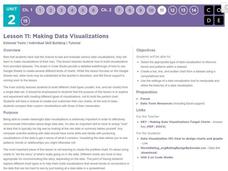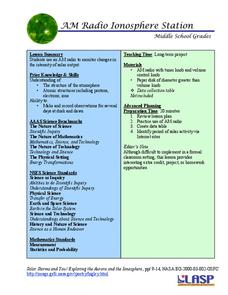Texas State Energy Conservation Office
Investigation: Water Wheel
Middle school scientists construct a working water wheel from an aluminum pie pan. Because of the sharp edges on the cut aluminum, this activity is for mature learners only. You could have your class compete to see whose wheel can lift...
Curated OER
The Marvels of Mud
Young scientists roll up their sleeves and get a little dirty in this three-day earth science investigation. Following the scientific method, children monitor the growth of algae in pond water samples in order to determine the role that...
Consumers Energy
Circuits and the Flow of Electricity Lesson Plan
I think I lost an electron. Are you sure? Yes, I'm positive! Starting with a hands-on demonstration and problem solving activity, young scientists define vocabulary related to circuitry and currents. Then they build their own circuits...
Mr. E. Science
Volcanoes
What is the difference between a shield volcano and a cinder cone volcano? How does the flow of lava influence the type of rock that's formed? A presentation on different aspects of volcanoes answers these questions for middle school...
Virginia Department of Education
States of Matter
Scientists have been studying exothermic reactions before they were cool. The lesson begins with a discussion and a demonstration of heat curves. Scholars then determine the heat of fusion of ice and the heat needed to boil water through...
Virginia Department of Education
The Hydrologic Cycle
There is the same amount of water on earth now as there was when it was formed. The water from your faucet could contain molecules that dinosaurs drank! Young scientists build their own hydrologic cycle model and observe it for five...
NASA
Space-Based Astronomy on the Internet
Young scientists compile everything they have learned into a report in the fifth and final lesson in a unit on the visible light spectrum. Access to photos from observatories, telescopes, and satellites allows learners to compare and...
It's About Time
Volcanos and the Atmosphere
In the summer of 1815, snow fell every month in New England. Was this related to the volcanic eruption of Tambora in Indonesia earlier in the year? Young scientists design their own experiments to research the long-term effect a volcanic...
Code.org
Making Data Visualizations
Relax ... now visualize the data. Introduce pupils to creating charts from a single data set. Using chart tools included in spreadsheet programs class members create data visualizations that display data. The activity encourages...
It's About Time
The History and Scale of the Solar System
Take scientists beyond our earthly reach and into the solar system. Pupils create a model of the solar system and discuss strengths and weaknesses of their model. They calculate distances in light years, discuss the nebular theory, and...
Virginia Department of Education
Evidence of Evolution
What an impression fossils make! In this activity, aspiring paleontologists view fossils and construct a timeline to further understand how the lack of natural adaptation caused historical organisms to become extinct. While they should...
Teach Engineering
Wetting and Contact Angle
Explore terminology related to water droplets. The sixth installment of a nine-part series teaches young scientists about wetting and contact angles between water droplets and surfaces. It also distinguishes between hydrophobic and...
PHET
AM Radio Ionosphere Station
Tune in! Young scientists use an AM radio at home to monitor solar output. The long-term project would be ideal in a flipped classroom or as an out-of-class project.
Code.org
Minecraft Hour of Code
Devote an hour to computer coding ... it's time well spent! The activity has young computer scientists write code to solve puzzles in the Minecraft game. They learn how to apply block codes and repeat loops.
Code.org
Practice Performance Task - Security and Hacking in the Real World
Young computer scientists create a visual artifact that represents their research into a computing innovation in the world of cybersecurity. They then work individually to write an essay on the impact of technology on cybersecurity.
Chicago Botanic Garden
Plant Phenology Data Analysis
Beginning in 1851, Thoreau recorded the dates of the first spring blooms in Concord, and this data is helping scientists analyze climate change! The culminating instructional activity in the series of four has pupils graph and analyze...
Space Awareness
Ocean Acidification
Learn the science behind ocean acidification and its effects on ocean wildlife. Young scientists conduct a laboratory investigation that monitors the acidity level of water. While burning a candle, learners capture the carbon dioxide in...
Columbus City Schools
Planet X
How did the earth become the mass that it is now? Your young scientists explore this question through the concept of density. Their inquiries consider the impact of gravity on the formation of planets. The culminating activity of the...
University of Southern California
What Is The Ocean?
Go on a tour of the ocean through the lens of a scientist. Learners read maps of the ocean floor, study tide behavior, examine wave motion, and analyze components of soil. Each lesson incorporates a hands-on component.
Channel Islands Film
Arlington Springs Man: Lesson Plan 3
Imagine being part of a team of scientists that discover the oldest human remains in North America. Imagine being part of the crew that documents this discovery. Class members get a change to be part of such an exciting adventure in a...
Channel Islands Film
Sa Hi Pa Ca (Once Upon a Time): Lesson Plan 2
What tools do archaeologists and anthropologist use to learned about what life was like in the past. After watching West of The West's documentary Once Upon a Time that details how scientists use artifacts to establish a history of the...
Centers for Ocean Sciences
Ocean and Great Lakes Literacy: Principle 7
Your mission, should you choose to accept it, is to take your class on an underwater adventure. The final installment in a seven-part series involving salt and freshwater bodies takes junior oceanographers below the surface in...
Science 4 Inquiry
Introducing the Types of Energy
Young scientists explore many different types of energy including light, heat, nuclear, sound, potential, and more. They match the types of energy and identify when energy transfers from one type to another.
National Nanotechnology Infrastructure Network
Save the Dinosaurs with Copper and Zinc!
Create a coat of armor for dinosaur volunteers. Young scientists explore the oxidation-reduction reaction facilitated by electric current. The result of the reaction is a dinosaur coated in copper and zinc, which leads to an...

























